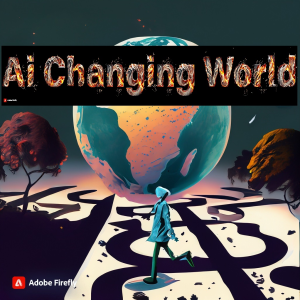HOW AI IS CHANGING THE WORLD
Artificial intelligence (AI) is having a major impact across numerous industries and aspects of modern society. Here are some of the key ways AI is revolutionizing our world:
Healthcare AI is transforming healthcare in several ways. It is helping doctors make faster, more accurate diagnoses by analyzing medical images and patient data. AI algorithms can detect tumors, analyze tissue samples, and interpret test results. This allows doctors to identify diseases earlier and develop more targeted treatment plans. AI chatbots and virtual assistants are making healthcare more accessible by providing initial information to patients.

AI is also being used to develop new pharmaceuticals faster. Machine learning algorithms can analyze molecular data and predict which compounds might effectively treat diseases. This accelerates the extremely lengthy process of drug discovery. AI is expected to open up entirely new approaches to developing medicines.
Transportation
Self-driving car technology is one of the most prominent examples of AI. Automakers and tech companies are racing to develop reliable autonomous vehicles. AI processes visual data from sensors and maps to navigate the vehicle. Advances in AI will enable self-driving cars to become mainstream in the coming decades. This will fundamentally change transportation and reduce traffic accidents.
AI is also revolutionizing public transportation. It can optimize schedules, routes, and capacity to improve efficiency. AI can track vehicle locations and predict maintenance needs. It even helps cities plan transportation infrastructure projects.
Manufacturing AI is transforming manufacturing in major ways. It enables predictive maintenance, warning of equipment issues before they cause breakdowns. This minimizes costly downtime. Machine learning algorithms also optimize supply chains and inventory management.
On the factory floor, AI improves quality control. Computer vision monitors production lines for defects. In some cases, AI systems can adjust equipment in real-time to prevent flaws. AI is even being used in advanced manufacturing techniques like 3D printing to improve precision.
Finance Banks, investment firms, and insurance companies are employing AI to make smarter financial decisions. AI can analyze massive amounts of financial data and news to forecast economic trends. It informs investments by predicting performance. In insurance, AI automates claim processing and detects fraud.
Chatbots and robo-advisors are transforming customer service in the finance industry. They provide fast, personalized support to customers to enhance satisfaction.
Cybersecurity AI algorithms excel at detecting cyber threats that are too subtle or fast-changing for humans to notice. They analyze network activity patterns to catch malware and block attacks. AI can also continuously strengthen defenses through machine learning. It adapts to new methods of infiltration. As cyberattacks grow in frequency and sophistication, AI will become essential for security.
Retail AI is revolutionizing consumer experiences. Retailers use AI to optimize their supply chain and maintain ideal inventory levels. AI chatbots answer customer questions, provide product recommendations, and enable faster purchases.
Stores are employing computer vision to track shoppers’ behavior and monitor product levels. This allows staff to promptly respond to needs. AI is also being used to develop customized marketing and promotions based on customer data. Overall, AI provides retailers with insights to enhance sales.
In summary, these are just some of the ways artificial intelligence is fundamentally changing major industries. As the technology advances, AI will inevitably disrupt society in unprecedented ways. It raises important questions about ethics and oversight that society must grapple with responsibly. While an uncertain future, the incredible potential of AI inspires both excitement and caution moving forward.











